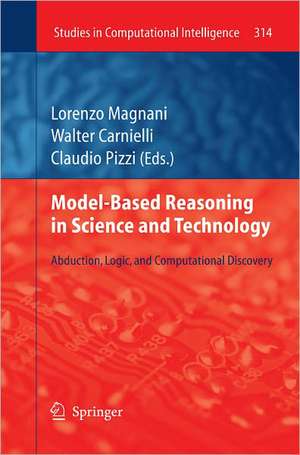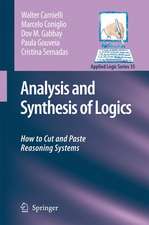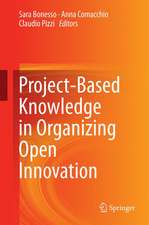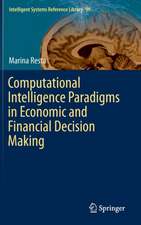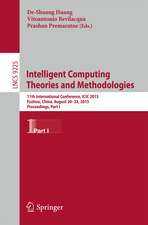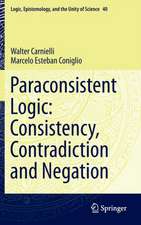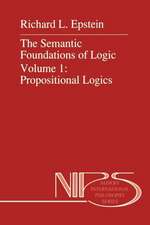Model-Based Reasoning in Science and Technology: Abduction, Logic, and Computational Discovery: Studies in Computational Intelligence, cartea 314
Editat de Lorenzo Magnani, Walter Carnielli, Claudio Pizzien Limba Engleză Hardback – 30 aug 2010
| Toate formatele și edițiile | Preț | Express |
|---|---|---|
| Paperback (1) | 1290.72 lei 6-8 săpt. | |
| Springer Berlin, Heidelberg – 13 oct 2012 | 1290.72 lei 6-8 săpt. | |
| Hardback (1) | 1297.50 lei 6-8 săpt. | |
| Springer Berlin, Heidelberg – 30 aug 2010 | 1297.50 lei 6-8 săpt. |
Din seria Studies in Computational Intelligence
- 20%
 Preț: 449.37 lei
Preț: 449.37 lei - 20%
 Preț: 1158.26 lei
Preț: 1158.26 lei - 20%
 Preț: 986.66 lei
Preț: 986.66 lei - 20%
 Preț: 1452.76 lei
Preț: 1452.76 lei - 20%
 Preț: 168.78 lei
Preț: 168.78 lei - 20%
 Preț: 1291.10 lei
Preț: 1291.10 lei - 18%
 Preț: 1112.30 lei
Preț: 1112.30 lei - 20%
 Preț: 565.39 lei
Preț: 565.39 lei - 20%
 Preț: 649.28 lei
Preț: 649.28 lei - 20%
 Preț: 1047.73 lei
Preț: 1047.73 lei - 20%
 Preț: 1578.96 lei
Preț: 1578.96 lei - 20%
 Preț: 643.50 lei
Preț: 643.50 lei - 20%
 Preț: 657.49 lei
Preț: 657.49 lei - 20%
 Preț: 993.28 lei
Preț: 993.28 lei - 20%
 Preț: 990.80 lei
Preț: 990.80 lei - 20%
 Preț: 989.96 lei
Preț: 989.96 lei - 20%
 Preț: 1165.69 lei
Preț: 1165.69 lei - 20%
 Preț: 1444.52 lei
Preț: 1444.52 lei - 20%
 Preț: 1041.96 lei
Preț: 1041.96 lei - 20%
 Preț: 1047.73 lei
Preț: 1047.73 lei - 20%
 Preț: 1046.06 lei
Preț: 1046.06 lei - 18%
 Preț: 2500.50 lei
Preț: 2500.50 lei - 20%
 Preț: 989.13 lei
Preț: 989.13 lei - 20%
 Preț: 1165.69 lei
Preț: 1165.69 lei - 20%
 Preț: 1164.05 lei
Preț: 1164.05 lei - 20%
 Preț: 1042.79 lei
Preț: 1042.79 lei - 20%
 Preț: 1460.19 lei
Preț: 1460.19 lei - 18%
 Preț: 1403.52 lei
Preț: 1403.52 lei - 18%
 Preț: 1124.92 lei
Preț: 1124.92 lei - 20%
 Preț: 1039.47 lei
Preț: 1039.47 lei - 20%
 Preț: 1008.11 lei
Preț: 1008.11 lei - 20%
 Preț: 1045.25 lei
Preț: 1045.25 lei - 20%
 Preț: 1275.42 lei
Preț: 1275.42 lei - 20%
 Preț: 1040.32 lei
Preț: 1040.32 lei - 20%
 Preț: 988.32 lei
Preț: 988.32 lei - 20%
 Preț: 1169.79 lei
Preț: 1169.79 lei - 20%
 Preț: 1162.37 lei
Preț: 1162.37 lei - 20%
 Preț: 1059.26 lei
Preț: 1059.26 lei - 20%
 Preț: 1164.05 lei
Preț: 1164.05 lei - 20%
 Preț: 1166.52 lei
Preț: 1166.52 lei - 20%
 Preț: 1459.38 lei
Preț: 1459.38 lei - 18%
 Preț: 1005.74 lei
Preț: 1005.74 lei - 20%
 Preț: 997.38 lei
Preț: 997.38 lei - 20%
 Preț: 1055.94 lei
Preț: 1055.94 lei - 20%
 Preț: 1284.47 lei
Preț: 1284.47 lei - 20%
 Preț: 994.08 lei
Preț: 994.08 lei - 20%
 Preț: 1048.72 lei
Preț: 1048.72 lei - 20%
 Preț: 1066.02 lei
Preț: 1066.02 lei - 20%
 Preț: 943.78 lei
Preț: 943.78 lei - 20%
 Preț: 1173.10 lei
Preț: 1173.10 lei
Preț: 1297.50 lei
Preț vechi: 1621.87 lei
-20% Nou
Puncte Express: 1946
Preț estimativ în valută:
248.28€ • 265.49$ • 207.01£
248.28€ • 265.49$ • 207.01£
Carte tipărită la comandă
Livrare economică 18 aprilie-02 mai
Preluare comenzi: 021 569.72.76
Specificații
ISBN-13: 9783642152221
ISBN-10: 3642152228
Pagini: 562
Ilustrații: XXX, 654 p. 98 illus.
Dimensiuni: 155 x 235 x 48 mm
Greutate: 1.13 kg
Ediția:2010
Editura: Springer Berlin, Heidelberg
Colecția Springer
Seria Studies in Computational Intelligence
Locul publicării:Berlin, Heidelberg, Germany
ISBN-10: 3642152228
Pagini: 562
Ilustrații: XXX, 654 p. 98 illus.
Dimensiuni: 155 x 235 x 48 mm
Greutate: 1.13 kg
Ediția:2010
Editura: Springer Berlin, Heidelberg
Colecția Springer
Seria Studies in Computational Intelligence
Locul publicării:Berlin, Heidelberg, Germany
Public țintă
ResearchCuprins
Abduction, Problem Solving, and Practical Reasoning.- Virtuous Distortion.- Naturalizing Peirce’s Semiotics: Ecological Psychology’s Solution to the Problem of Creative Abduction.- Smart Abducers as Violent Abducers.- Different Cognitive Styles in the Academy-Industry Collaboration.- Abduction, Induction, and Analogy.- Belief Revision vs. Conceptual Change in Mathematics.- Affordances as Abductive Anchors.- A Model-Based Reasoning Approach to Prevent Crime.- Abducing the Crisis.- Pathophysiology of Cancer and the Entropy Concept.- A Pattern Language for Roberto Burle Marx Landscape Design.- A Visual Model of Peirce’s 66 Classes of Signs Unravels His Late Proposal of Enlarging Semiotic Theory.- The Role of Agency Detection in the Invention of Supernatural Beings.- Formal and Computational Aspects of Model Based Reasoning.- Does Logic Count?.- Causal Abduction and Alternative Assessment: A Logical Problem in Penal Law.- On a Theoretical Analysis of Deceiving: How to Resist a Bullshit Attack.- Using Analogical Representations for Mathematical Concept Formation.- Good Experimental Methodologies and Simulation in Autonomous Mobile Robotics.- The Logical Process of Model-Based Reasoning.- Constructive Research and Info-computational Knowledge Generation.- Emergent Semiotics in Genetic Programming and the Self-Adaptive Semantic Crossover.- An Episodic Memory Implementation for a Virtual Creature.- Abduction and Meaning in Evolutionary Soundscapes.- Consequences of a Diagrammatic Representation of Paul Cohen’s Forcing Technique Based on C.S. Peirce’s Existential Graphs.- Models, Mental Models, Representations.- How Brains Make Mental Models.- Applications of an Implementation Story for Non-sentential Models.- Does Everyone Think, or Is It Just Me?.- Morality Accordingto a Cognitive Interpretation: A Semantic Model for Moral Behavior.- The Symbolic Model for Algebra: Functions and Mechanisms.- The Theoretician’s Gambits: Scientific Representations, Their Formats and Content.- Modeling the Epistemological Multipolarity of Semiotic Objects.- Imagination in Thought Experimentation: Sketching a Cognitive Approach to Thought Experiments.- Representations of Contemporaneous Events of a Story for Novice Readers.- Understanding and Augmenting Human Morality: An Introduction to the ACTWith Model of Conscience.- Analog Modeling of Human Cognitive Functions with Tripartite Synapses.- The Leyden Jar in Luigi Galvani’s thought: A Case of Analogical Visual Modeling.- Modeling the Causal Structure of the History of Science.
Textul de pe ultima copertă
The volume is based on the papers that were presented at the internationalconference Model-Based Reasoning in Science and Technology (MBR09_BRAZIL), heldat the University of Campinas (UNICAMP), Campinas, Brazil, December 2009. The presentations given at the conference explored how scientific cognition, but several other kinds as well, use models, abduction, and explanatory reasoning to produce important or creative changes in theories and concepts. Some speakers addressed the problem of model-based reasoning in technology, and stressed the issue of science and technological innovation. The various contributions of the book are written by interdisciplinary researchers who are active in the area of creative reasoning in logic, science, and technology: the most recent results and achievements about the topics above are illustrated in detail in the papers. The book is divided in three parts, which cover the following main areas: part I, abduction, problem solving, and practical reasoning; part II: formal and computational aspects of model based reasoning; part III, models, mental models, representations.
Caracteristici
Deals with the logical, epistemological, and cognitive aspects of modeling practices employed in science and technology Written by leading experts in this field State-of-the-Art book
